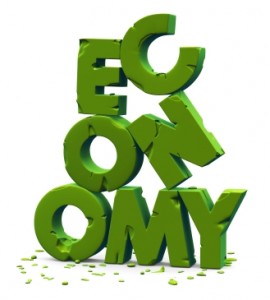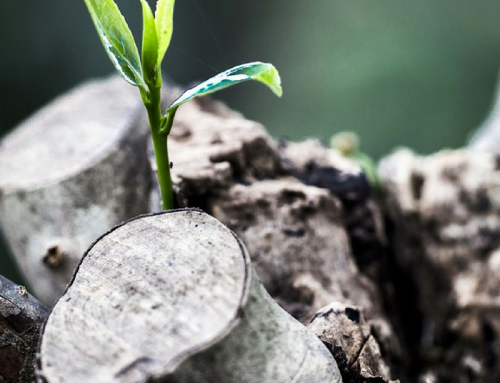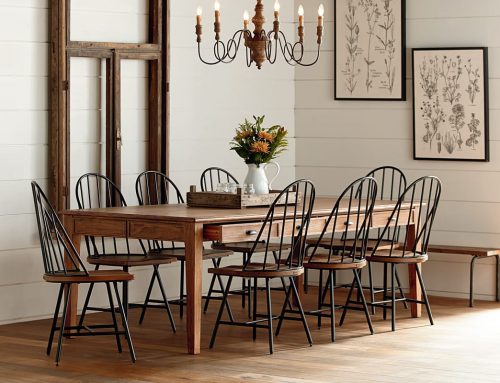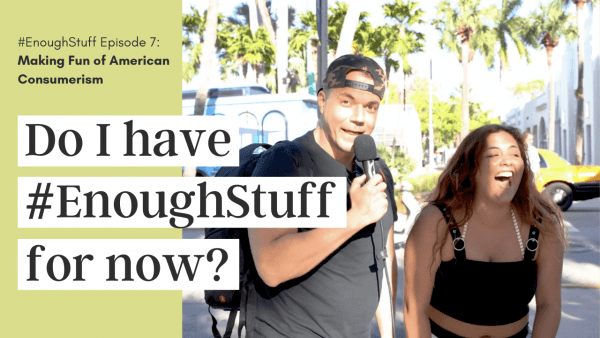The U.S. and world economy has bounced all over the place in the last several decades, and it’s fair to say that the economy was a driving factor in both the recent Brexit vote as well as the recent U.S. election. We’re not economists, and we’re not going to predict what will or won’t happen with the economy in the near or long-term future. However, it does lead to an interesting discussion of how the economy and addictive consumerism interact (after others unclench of course at the very thought of postconsumerism since the current U.S. economic model is 70% consumer spending). When the economy is worse, do people buy less? You may be surprised by the answers.
The Issue Revolves Around the False Connection Between Happiness and Stuff
Let’s, for a moment, not talk about the monetary fallout of economic ups and downs. Let’s talk about the mental and emotional impact. As an economy dips down, more people find themselves unemployed or under-employed. The unquestionable result of this is a certain level of depression and sadness, even if it’s not experienced by everyone. It’s the inevitable consequence of feeling stressed about finances and undervalued as a person. Why is this relevant to the relationship between the economy and consumerism? Because “stuff” and consumerism isn’t as much about money in the current era as it is about a mental health bandaid.
Unfortunately, In the Current Era, People Treat Depression with “Stuff”
Our culture’s disease of addictive consumerism isn’t just about wanting to create identity with “stuff” or gain status with “stuff,” it’s about filling emotional holes with “stuff.” We’ve talked about this epidemic a great deal at Postconsumers and you can read about it here, here, here and here. So, the basic current equation that you need to keep in mind is that as depression and sadness rise, so does the purchasing of “stuff.”
But … Less Money, Right?
We know what you’re thinking. That the proper equation would be if there is less money then customers will buy less stuff. We understand why people think that this would make sense. However, what people are not accounting for is how cheap it’s become to purchase “stuff.” As big box stores began to rise, a combination of off-shore labor and automation made it easy to offer lots of material goods for very cheap. There’s a reason that we call it “addictive consumerism.” That reason is that the impact is like a drug and so is the methodology for getting it into the public’s hands.
But It’s Not All Bad News …
There’s a certain degree to which you want people to spend money during an economic downtown until the experts working on a new economic model based on well-being succeed. The more that people save money, the less the current economic paradigm grows. We don’t actually like the mental and emotional health reasons behind why people tend to buy as much if not more stuff during an economic downturn, however.
Oddly, People Often Spend Less During a Good Economy
This is a good article that summarizes how, often, people save more money and spend less when the economy is good. There are many hypotheses for why this is. People may feel less confident that the economy will stay good and are therefore saving for a rainy day, but the most likely explanation is that during an economic upswing people tend to feel as though they have more disposable income and therefore put more of it away. We’d probably also argue that in a time of economic prosperity, people are doing a little less “retail therapy” or, alternatively, are buying fewer things at a higher price point rather than many cheap things.
Really, It Has Little to do with What Makes Financial Sense
What we’re getting at here is that in a bizarre twist of how reality should work, the consumer machine has become so successful that what and how people buy has very little to do with what finances actually dictate and very much to do with what emotion dictates. The low emotions of downturns in the economy cause people to fill their lives with “stuff.” The positive thinking of an upturn in the economy often results in savings. Does that make little sense to you? We understand. We’re somewhat baffled as well.
Don’t Be an Emotional Consumer
Of course, we would never tell you what to buy and when. However, we would give you gentle advice that your purchasing decisions should never be entirely guided by emotional or mental health states. We’d remind people that “stuff” really can’t make you happy in the end and you truly can’t love a thing. No matter what the economy does in the coming years, remember that your purchasing decisions are separate from your mental and emotional reaction to it, but they are very tied to the financial reality of the economy. As always, our best advice to you is to be mindful and fall in love with asking how much is enough for today.
Did we miss a point about how the economy and society’s relationship with consumerism interact? If so, tell us about it on the social media channels below.
Facebook | Twitter | Instagram | Tumblr | Pinterest | Google+ | Medium




